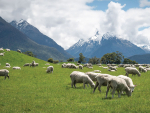Facial eczema is chronic toxicity caused by the ingestion of spores from pasture and their conversion into sporidesmin in blood.
The disease appears to be spreading into the North Island central highlands and even to the South Island. If summers get warmer incidence may spread further.
However, disease management continues to improve. Progressive farmers no longer count it as a non-manageable problem. Why so?
These farmers have learned to complement grass with supplementary feeding through in-shed feed systems and feed pads. This has been targeted at optimising milk yield to body weight in milk solids but it's also allowed farmers to manage several nutrition parameters that traditional drenching and water dosing cannot.
Dosing through feed means more even dosing.
It allows use of safer more effective zinc oxide.
Supplementary feed allows optimum pasture use, minimising fungal growth.
Supplementary feed intake dilutes spore intake in severe situations.
We can add other nutritional components that help maintain optimum immunity and metabolic activity, including,
- Calcium
- Phosphorus
- Vitamin E and selenium
- Vitamin D metabolites
Since the 1970s zinc in the diet, as a drench, bolus, in water or feed, has been one of the most effective methods to reducing facial eczema impact. It's sometimes, however, thought of as the only tool.
But when spore numbers are really high, zinc is often not enough to prevent damage. What's more, like many strong medicines, zinc comes with side effects. For example, it can be antagonistic to other minerals, especially calcium, increasing the likelihood of milk fever.
With planning, these side effects can be offset. There are other means in the tool kit of bolstering immunity and decreasing exposure to spores.
Feeding non pasture feeds allows spore intake to be reduced through dilution.
It's been demonstrated that the right proportion of micro minerals, vitamins, and antioxidants, in particular vitamin E, can further contribute to the resistance of animals to facial eczema (Munday et. al.).
Therapeutic levels of zinc can reduce calcium uptake. However, the vitamin D metabolite Hy-D increases active absorption of both calcium and phosphorus, helping offset zinc antagonism and reducing milk fever risk.
We also need to watch copper intake while spore levels are high. Free copper is needed to create superoxide radicals. Organic (or chelated) copper in zinc supplements is sometimes offered as safer. There is no safe form of copper. To date no published work demonstrates reduced impact.
Summary
- Zinc inhibits the generation of the superoxide radical by sporidesmin.
- Copper causes the spore to become toxic.
- There is no safe copper supplement.
- Zinc reduces copper absorption.
- Non-pasture feeds during risk periods will help limit spore exposure.
- Zinc antagonises calcium absorption, increasing the risk of hypocalcaemia. The use of Hy-D can improve calcium absorption.
- Vitamin E has been shown to act differently to zinc, helping to prevent damage by free radicals involved with facial eczema.
Dr Joe McGrath is Sollus head nutritionist.


















